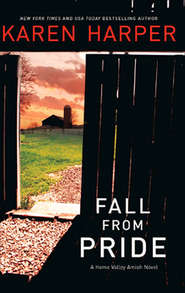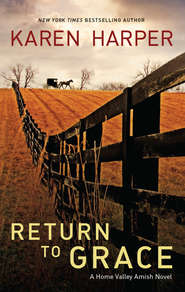По всем вопросам обращайтесь на: info@litportal.ru
(©) 2003-2024.
✖
Finding Mercy
Автор
Год написания книги
2019
Настройки чтения
Размер шрифта
Высота строк
Поля
“But we are meeting, and I want to learn your ways. I admire much about your life.”
“Okay, then,” she said, tossing the curry brush onto a hay bale. She hoped Andrew didn’t notice she was blushing over a compliment as simple as that. She stroked Fern hard with the palms of her hands a couple of times where she’d brushed her, whispering, “Ser gut, ser gut, mein Fern.”
She picked up some of the tack Aaron had already taken from the pegs along the wall near the stalls. “Here’s what to remember to harness a horse and hitch him or her to the buggy.” She named the different parts of the tack while she used each, then reviewed. “Collar around neck, breast strap between forelegs, crupper under tail…”
“That under-tail stuff can be dangerous, right? Got to watch out on that back end.”
She turned to look directly at him for the first time since she’d started harnessing. “You mean, what we call horse apples? Mostly, that happens when they’re grazing in the field or especially on the road. It’s one of the things some English hold against us, that and they say these steel wheel rims on the buggy cut into the asphalt. But we have a right to be there too, and we put up with fumes and noise and the danger of being hit or run over.”
“I never thought about outsiders disliking the Amish for anything. Do they harass or retaliate against you? Could that be a reason someone would be looking in the windows—to plan something against your family?”
“There have been a few hate crimes. Some folks blame us for being pacifists, for turning the other cheek, not serving in the army, and they take advantage of that. You know, I’ll tell Aaron to ask around to see if anyone else has had people looking in their windows. It could be just someone curious. Okay, here now, let’s back her up to the buggy. These long, narrow hickory pieces attach the horse to the buggy and keep her in line with it.”
As he helped her, he said, “I was surprised to see the bishop’s buggy had a foot brake. I mean, can’t you just tell the horse to ‘whoa’?”
“Going fast enough, the buggy could slide into her. Did you notice all our wagons and buggies have reflective orange safety triangles on the back? Headlights too—a high- and low-beam switch on the floor with the battery under the seat. Now, whatever is keeping Aaron?” she asked, taking a step back when he came closer to peer into the buggy.
“I’m learning a lot from you anyway. So, does it matter which side the driver sits on if two are in the buggy?”
“Sure, rules for everything, though this is not in the Ordnung. That’s the big church rules, moral things. But, ya, the woman always sits to the left of her husband or any man in a buggy.”
“Sounds good to me. That means the man is always right—right?”
She turned to him with a little laugh. He still bent so close to look inside the buggy that her bonnet brim bounced against his cheek. Again, that strange, silent but oh-so-loud force crackled between them. They breathed in unison. His lower lip dropped slightly. Even in the dim barn, she could see her reflection in his narrowed, blue eyes.
“Guess what?” Aaron’s voice startled them apart as he hurried back into the barn. “That courting buggy cost Mose’s older brother almost twelve-hundred bucks! It’s got emerald-green carpeting! His father was against it, but he saved up ’cause he wanted it so bad! Oh—you did it without me,” he added as Ella climbed quickly up in the buggy and bent to take the reins.
“That’s okay, Aaron,” she said. “Let Andrew hitch the other one himself and you just watch this time. And then take him for a ride but just up and down the lane.”
“I know what to do. You, Grossmamm, Mamm and Daad don’t have to tell me everything!”
“Danki, Ella!” Andrew shouted after her. “Ser gut, ser gut!”
“She can be really bossy,” she overheard Aaron say as she blew a kiss to Fern to speed her up—or was it a kiss to Andrew?
* * *
As Ella headed home from the mill, the early afternoon sky clouded over and the wind picked up. The weather was important to her people, a big topic of conversation, but she hadn’t heard it was going to storm. She could feel the extra weight of the buggy from the four big bags of ground shells, or else she would have giddyapped Fern faster. To avoid getting caught in a downpour, she turned onto a farmer’s lane that was a shortcut home. It was only wide enough for a four-horse hitch or big work wagon, but if she met someone coming the other way, she could easily pull off on the grassy edge of the cornfield.
Her thoughts on Andrew, she didn’t hear the motor vehicle behind her at first. Too much of a smooth sound, not loud like an English farmer’s tractor or planter. She craned her neck and tried to look back through the thick plastic window, which she hadn’t rolled up today. It looked like a big buggy at first but it was a van, a black one. It seemed to have dark-tinted windows. She knew how impatient English drivers could be. She’d better pull off and let it pass. But why would a vehicle that probably wasn’t local be on this cut-cross lane? There was nothing back here but corn and a couple of woodlots.
You might know, it began to rain. She didn’t stop to unroll the plastic windshield in front of her and blew Fern a kiss to get her to a place up ahead, which looked like a good pull-off spot. Most drivers in Amish country were considerate and polite—at least the ones who weren’t out drinking, like Sam Lee might have been, or who weren’t taking the hills fast because of the rollercoaster-like thrills.
Thunder rumbled even as the van’s engine behind got louder, vroom, vroom, like it was going to leap at her. The vehicle came closer, bumped the back of her buggy! Didn’t they see the sign that read Slow-Moving Vehicle? The van’s lights had been on low but now bright headlights popped on. Another bump, harder. The buggy jolted. She was nearly to the pull-off spot—or should she just keep going? No way she could escape, however fast Fern could go.
Rain pattered on her bonnet as Ella leaned out and looked behind, even extended an open hand as if to say, “Keep back! Stop!” Ya, the windows of the vehicle were tinted so dark she could not see the driver. The windshield wipers whipped back and forth hard. Her heart pounding, she threw herself back inside the buggy.
Though she wasn’t to the best spot yet, she swerved Fern to the right onto the grassy fringe of the field. Rain thudded on the fiberglass frame of the buggy like loud drums. She twisted around to stare out through her back plastic window. To her dismay, the car stopped, backed up and turned in too, this time shoving the buggy almost into Fern. Thank God, she wasn’t on the edge of a treed ravine like the one that had almost killed Ray-Lynn when she plunged over it! But that would-be killer was in prison. Out here in the open, exposed, no one around—what did this person want? Just to scare her? Or worse?
Don’t fight back…turn the other cheek, she recited to herself. Should she leave Fern, get out and run through the field? The plowed soil and rain would make for slow going. The van couldn’t follow but a person could. She’d be a sitting duck if someone had a camera—or a gun. Some terrible attacks on the Amish she’d heard or read about increased her panic: some drunk English teens turned over a buggy with a woman inside; an Amish boy throwing tomatoes at cars was shot to death. The only thing she had to fight back with, without really fighting back, was four bags of ground oyster shells.
When lightning crackled and struck something nearby, Ella nearly jumped out of the buggy. Had it hit a tree in the woodlot? If it struck again, what was taller out here in the open, the buggy or the van? Metal would attract the bolt, wouldn’t it? No one emerged from the van as it just sat there, rumbling low with the front windshield like a huge eye just staring at her. She should have told Daad and Andrew about that light she glimpsed on the hill. At least there was no more bumping or shoving. What did that person want?
She fumbled on the floor for her jackknife and slit the string stitching at the top of one of the big plastic bags. If someone got out and came around to hurt her, she’d fling ground oyster shells at them, in their eyes, get out and run across the corner of the field into the trees, lightning or not. Surely, this could not have anything to do with their hiding Andrew. No one around here knew who he really was, did they? So how could anyone have found him? This had to be about something else, about her. Like Daad had suggested, was she being stalked?
The van hulked behind her like a big beast, its hood and front bumper tight against her buggy, as if playing with its prey. She was certain her wheels would sink in the soil if she drove straight ahead into the field.
While thunder rumbled again, this time more distantly, she dug out fistfuls of the ground shells and dumped them in her lap, ready to throw. Sweating, praying—Oh Lord, please take care of Your own—she waited. Then came a deep honk-honk! of the van’s horn. Ella jumped. Fern snorted and startled. After another hard bump of the buggy, the van backed out, turned and drove away.
Despite the rain, Ella scrambled down from the seat, spewing ground shells and dust from her apron. She was going to get that license plate at any cost, tell Sheriff Freeman. Maybe the sheriff would know if others had been harassed this way too.
But the license plate was draped with a big dark cloth that dragged behind in the mud. It looked like an Amish woman’s cape, black as ravens’ wings. For a moment, she thought she glimpsed a face in the big, tinted back window, but it looked too thin—the white barrel of not a gun but a lamp? A telescope? Her grandfather had one they used to watch the stars through from the hilltop, years ago.
As the van disappeared down the lane at the end of the field, Ella heaved a frustrated, furious sigh and broke into tears she’d been holding back. She crunched through the wet oyster-shell grit and scrambled back up into the feeble protection of the buggy. At least the spilled feed would mark the exact spot so she could tell the sheriff where to look for tire tracks or anything to identify the van.
“Thank you, Lord, for Your protection,” she whispered as she picked up the reins and backed Fern and the buggy out onto the road. One of the buggy wheels seemed wobbly, but she had no choice but to head home. She was wet and chilled but that wasn’t why her hands were shaking so hard she almost flapped the reins. She reached behind into the small back seat and storage area for her cape.
It was gone, not on the floor, nowhere, but she knew she’d left it there when she went into the mill. And she knew now what was being dragged to death in pieces through the mud behind that black van.
6
AFTER A DASH through the woodlot, where she was afraid the van might appear again, Ella emerged onto Oakridge and headed straight for home. Now only the rattle of a bent back wheel pursued her until she heard the piercing shriek of a siren behind her.
She gasped when she saw a black vehicle. She stuck her head out to look back. Thank heavens! Only an Eden County police car. It must be the sheriff! She reined in, then realized it could be a trick. It wasn’t the sheriff’s car—no markings—nor did she recognize the short, muscular man who emerged from it, but he was wearing an officer’s uniform.
He must have realized her unease, because before approaching her he called out, “Winston Hayes, ma’am, the new Eden County deputy. You don’t have a fluorescent safety triangle on the back of your buggy. It’s the law. Some Amish been protesting that and even went to jail over it in Indiana.”
She looked at the back of her buggy. Not only was the safety sign gone but the back was scuffed and dented. Obviously, the van had knocked it off somewhere. She’d rather tell Sheriff Freeman what had happened, but she couldn’t pass over it with this man. Deputy Winston Hayes flashed his badge at her. Looking very sure of himself, he stood so erect. He was built strong, almost stocky, but was only tall enough to look her straight in the eyes—though she couldn’t see his eyes since he wore reflector-type sunglasses, despite the fact that the sky was a stormy gray. In her line of view, right behind his head, he’d left his light bar flashing. It made it look as if pulsating colors sprang from his head.
A buggy went by. She recognized the folks who stared but went on.
“Well, then?” he prompted, frowning.
“A black van bumped into the back of my buggy about a quarter hour ago, and I didn’t realize the sign was gone.”
“Yeah, sorry,” he said, whipping off his glasses and bending closer to the damage, then brushing his hand across the scuff marks. “Your left wheel rim’s askew too. Can you give me a description of the vehicle?” he asked, taking from his jacket pocket a small device that must be a cell phone, but one he typed things into with his thumbs.
“I’m not sure of the make. Tinted windows so I can’t describe anyone inside. And what’s scary is they had their license plate blacked out.”
“Someone with malice aforethought,” he muttered, straightening and putting a hand on his gun belt. “And this was where, ma’am?”
“I was taking a shortcut through the fields between Troyers Mill and here. I intend to tell Sheriff Freeman about it. I’d like to head home now.”
“Which is where?” he asked, his thumbs busy again on his little machine. A car went past; it slowed and people stared.
“I live at the Lantz farm, 400 Oakridge Road. I’m Ella Lantz.”
“Oh, yeah, the lavender farm. You and one of your brothers helped the guy in the wreck the first day I was here. Sorry for being so curious, but I’m trying to familiarize myself with your people. So, three brothers still at home?”











